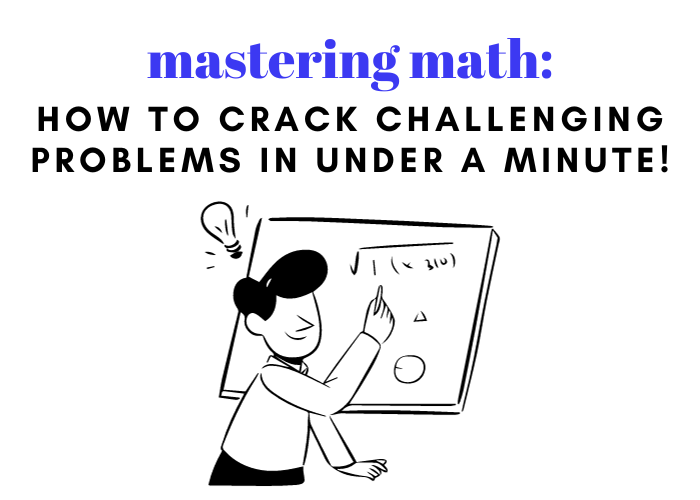
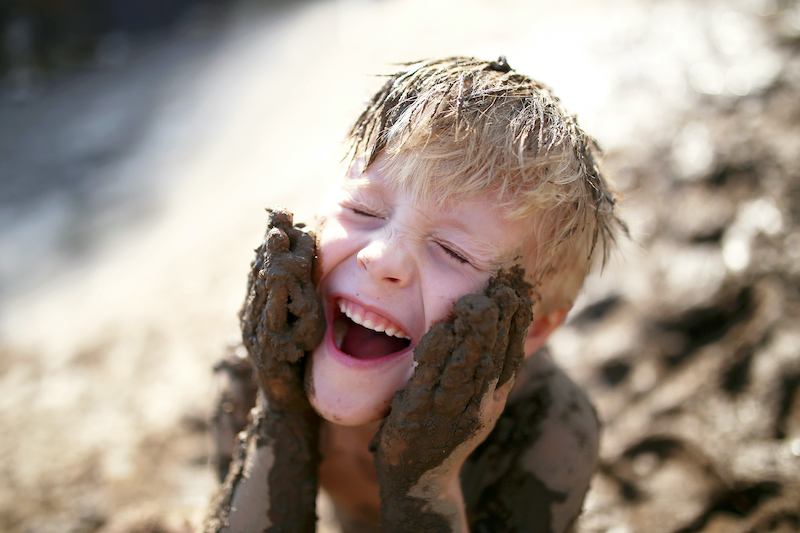
Last Updated on June 26, 2023
If you have children then you know the pain that comes with wiping snotty noses, sticky hands on your clean pants, and spending way too long detangling hair. It’s no surprise that personal hygiene is one of the most important habits that your child can work on, and we’re here to help you figure out how to get them to do it.
Not every child is going to care about staying clean. Who are we kidding? You know that, if under a certain age (and sometimes even longer), your kid probably doesn’t really care at all about their personal hygiene. They may even love being dirty, which is why it’s important to find the best approach to get your children to understand the importance of being clean, especially in a time when diseases like COVID-19 and others are running rampant.
So, let’s talk hygiene and how you can foster it as a habit within your kids.
In the wake of COVID-19, you’ve probably been cracking down on washing hands and using hand sanitizer, which is great! Hopefully your kids understand why it’s so important to do these things, but if you’re looking for examples to give them to show why more than just clean hands are necessary, read on.
This one seems obvious, but there are far more diseases that you can prevent with hand washing than you may realize. Did you know that there are fifteen diseases you can mostly prevent by simply washing your hands, hair, and clothes? The CDC offers a comprehensive list of them, including what you can do to avoid them.
The CDC also teaches us:
Wow! Imagine if we were all a little cleaner, just how much disease we could prevent together.
Being Clean Helps With Everyday and Social Life
Have you ever had to sit next to someone in school that simply reeked of body odor? Did you absolutely loathe sitting next to that person? Now imagine you find out later that you were that person to someone else? Not cool.
Worse, have you ever had to sit next to someone who was constantly coughing, sneezing, or clearing their throat? Even worse worse, a person who was frequently farting or burping?
It’s just common courtesy to keep yourself clean, looking and smelling nice, and healthy enough to not be spreading your germs. Teach your kids the importance of being aware of their appearance and general hygiene as it can help people around them. Studies show that people who look and smell nice, as well as practice courteous coughing/sneezing and staying home when sick, are better liked and find success easier.
It’s as simple as that: if you’re clean, people like you better!
That’s right, and we’re sure you’ve heard this one. If you’ve ever experienced a depression day, even if you don’t have depression and are just feeling a little lifeless, experts say the quickest way to get out of that rut is to bathe.
Cleaning our skin, genitals, mouths, and hair is a great way to improve our moods. It provides a sense of accomplishment, and makes it harder to lay back down on that filthy bed. So, if you or your kids are having a bad day and just can’t seem to shake the rain clouds, try taking a hot shower or bath, brushing your teeth, or putting on clean clothes and see how it can motivate you to get going on other things you’ve been putting off!
Now comes the hard part: getting your kids to take care of hygiene on their own. You can’t dedicate every moment of your day to harping on your children to stop picking their nose or to brush their wild hair, so it’s pretty valuable to get kids to do these things on their own.
Rather than sharply reprimanding your children when they bound down the stairs in the morning with dirty clothes and unkempt hair, we’d like to suggest the opposite: reward them when they do the right thing.
This doesn’t have to mean physical rewards, either. As long as you are acknowledging and encouraging your kids when they do the right thing, they’ll begin to understand that they have the power to control their own appearance and how they are received.
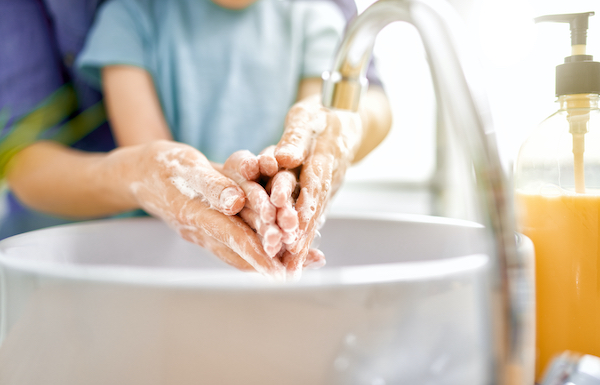
You already know it’s important to wash hands. There are thousands of germs just chilling on your kids’ hands, and then those hands end up in their nose, eyes, and mouth on a frequent basis. To prevent many diseases from getting into their small bodies, teach them to wash their hands—
Still can’t get them to wash up as often as you’d like? Let them choose their own hand sanitizer and encourage them to use it whenever they are unable to wash their hands. “The use of an alcohol gel hand sanitizer in the classroom provided an overall reduction in absenteeism due to infection by 19.8% among 16 elementary schools and 6,000 students,” says the CDC.
Brushing teeth twice a day not only helps keep your mouth smelling clean, but helps the overall health of your teeth, too. Daily, intentional teeth-brushing can prevent things like gingivitis, gum disease, and other, orally-transmitted diseases. We found this list of ten unexpected benefits of daily toothbrushing to be pretty interesting, but for your kids you can just stick with telling them it helps with bad breath.
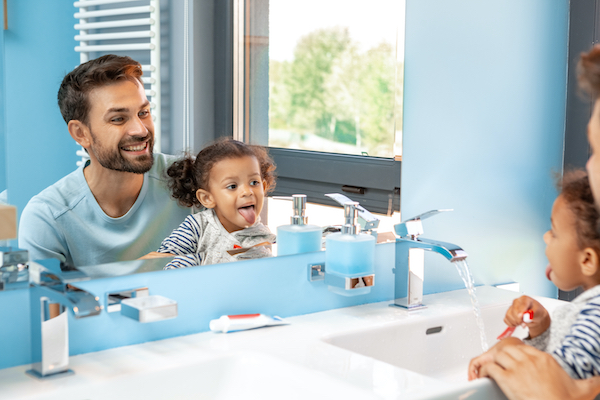
One great tip we suggest trying out is finding your children a dentist that they really love. There are so many amazing pediatric dentists near you, and they can make going to the dentist much more fun, less anxiety-inducing, and can teach kids how to take care of their teeth properly
Hair seems like such a pain to take care of, especially when it’s not even your own. If you’ve ever had to detangle your child’s hair after a beach day, a particularly windy day, or just when you’ve noticed they haven’t done it on their own in far too long… you know how painful the process can be.
It’s not just that your kid is probably groaning and complaining about the act of brushing their hair, it’s also the time and patience you have to dedicate to gently combing out every little tangle. And if they have hair types 3-4, the process of hair care becomes even more time-consuming. So, teach them early on to take care of it with your help, and together their hair can become a great way to express themselves, rather than a hassle.
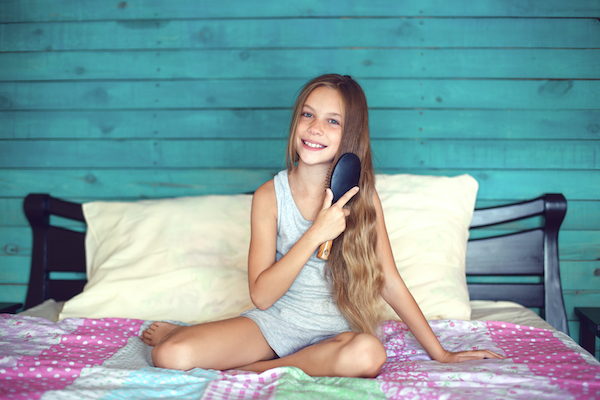
Kid still not showing an interest in their own hair? Offer to let them cut it off, which makes it less of a problem for both of you, and teaches them about self-expression.
This is a big one. Besides just the aforementioned B.O., there are actually millions of germs that hang out on the surface of the human body. They are in our hair, armpits, genital areas, and more. Clothes gather germs from public surfaces throughout the day, and it’s important to wash regularly to keep the surface of your skin from accumulating too many.
When it comes to bath time with your kids, make it fun by adding in toys, music, rewards, and doing it together. As they get older they’ll develop their own routines and you can again compliment them on their good work!
It feels like we’ve all had a finger biting habit at some point. It’s a natural phase for your kids to go through, as it can manifest as a way for them to deal with anxiety. However, besides your mouth and genitals, fingernails are probably the most germ-friendly area on your entire body! And your kids are putting them in their mouths!
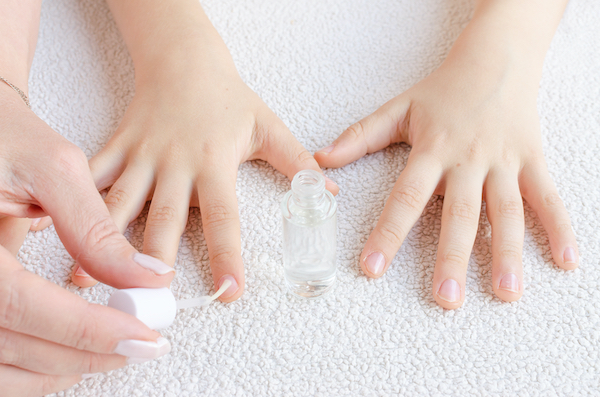
The Daily Meal teaches us that fingernail biting can lead to some other problems too, such as teeth grinding, tooth wear and tear, and fingertip bleeding.
So, how do you get your kids to stop? There are plenty of products you can use to break this bad habit, but as we always say, it’s much better to replace a bad habit with a good one than to try and eradicate the bad one.
Try replacing this nervous tick with:
If your kid knows that you’re calling attention to their nail biting habit not because it’s gross or unsightly, but because you want to help them heal and be healthier, this can be the best solution for you both. Ask them to stop when you catch them doing it, but use gentle reminders that you know they can beat this.
This is a huge one, especially in the wake of COVID-19. Not only is it a courtesy to not sneeze or cough on someone, but it can prevent a lot of that mucus and those germs from spreading. Teach your children from a young age that coughing and sneezing into their elbow or into a tissue is the appropriate way.
Finally, the best way to help your children understand the importance of personal hygiene is to teach them to keep their personal space relatively clean and organized. There’s a certain amount of pride that comes with having a clean space, and if they are proud of their space then they will naturally want to be proud of their appearance as well.
Studies show that having a clean space can lead to some really great benefits such as peace of mind, physical health, and higher motivation. Help your children clean the first few times to show them that doing homework, relaxing, and having people in their space when it’s clean and organized can be much better than having a messy room. Then, let them have control of their method and allow them to clean their space as needed, again with gentle reminders.
Shutterstock image: https://www.shutterstock.com/image-photo/housewife-children-picking-toys-after-playing-1090548821
Alright, now that we’ve outlined some of the best personal hygiene habits for your kids, it’s time to start making them stick. We know it can be difficult to get your kids to stay motivated about anything, so let’s talk about the ways we think can work for them to make these practices a habit.
We know it’s hard to keep up with everything you think you should be doing as a parent. With taking care of your family and home, helping with homework, attending extracurriculars, keeping your own job and personal time, and everything else, it’s gotta be hard to also keep track of good habit-formation. However, there are some creative ways you can help yourself out here, and your kids will see the good you’re doing and want to follow along.
To help with your own personal hygiene, try writing yourself notes with your daily tasks. Or, ask your kids to write the note for you because giving them the important job of helping you personally improve will make them feel included and as if they’re a part of your journey. They might even ask you to write one back for them, then you can hold each other accountable each day.
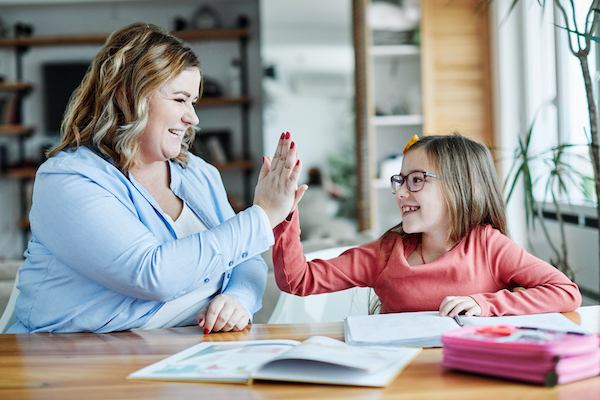
Make your routine a priority. That means you do the important things first thing, then check in with your kids to compare. Doing the daily routine together can also help solidify the habits.
Offer yourself a reward in the same way you’d offer them one. As you work on your daily routine and habit-building it will help you stay motivated and connected as you achieve goals together.
Make it a game! Kids love nothing more than to play games with their favorite person, you! If you can gamify your daily routine your kids will latch onto it quickly. Other ways to make it more fun are:
If you put an emphasis on hygiene tasks being fun and necessary, rather than an absolute rule, your kids won’t feel as pressured and won’t feel resistant.
Once you’ve gotten into the groove of personal hygiene with your kids, do not lose steam! This is the most important time to stay focused, because stopping now requires you to start over, which many kids (and adults) can find overwhelming!
Ways to stay motivated:
Doing these things can really solidify the entire process of habit formation, and you’ll be happy that you took the time to do them. Your kids are just happy to be included, so don’t forget that you are their biggest source of motivation!

